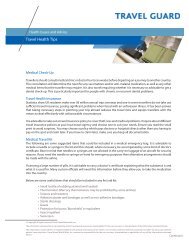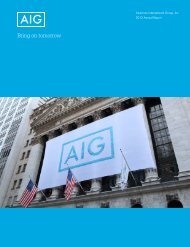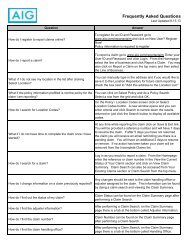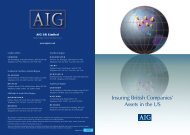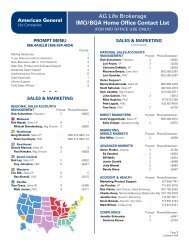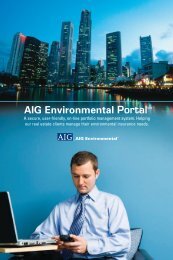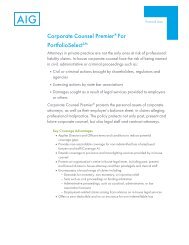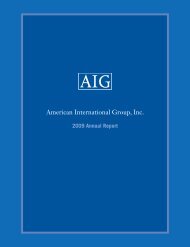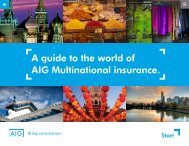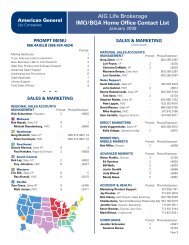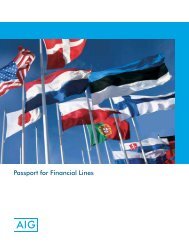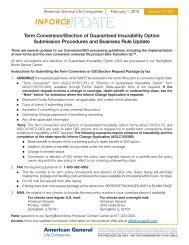2007 Annual Report - AIG.com
2007 Annual Report - AIG.com
2007 Annual Report - AIG.com
You also want an ePaper? Increase the reach of your titles
YUMPU automatically turns print PDFs into web optimized ePapers that Google loves.
American International Group, Inc. and Subsidiaries<br />
in Tata <strong>AIG</strong> General Insurance Company, Ltd. in India. Substantially<br />
all of <strong>AIG</strong>’s equity interest in Allied World Assurance<br />
Holdings, Ltd. was sold by <strong>AIG</strong> in December <strong>2007</strong>. For a<br />
discussion of <strong>AIG</strong>’s investments in partially owned <strong>com</strong>panies,<br />
see Note 1(s) to Consolidated Financial Statements.<br />
Locations of Certain Assets<br />
Regulation<br />
<strong>AIG</strong>’s operations around the world are subject to regulation by<br />
many different types of regulatory authorities, including insurance,<br />
securities, investment advisory, banking and thrift regulators in<br />
the United States and abroad. The regulatory environment can<br />
have a significant effect on <strong>AIG</strong> and its business. <strong>AIG</strong>’s operations<br />
have be<strong>com</strong>e more diverse and consumer-oriented, increasing the<br />
scope of regulatory supervision and the possibility of intervention.<br />
Although <strong>AIG</strong> cannot predict the scope or effect of such regulation<br />
on its business, <strong>AIG</strong> expects further regulation of its domestic<br />
consumer finance operations as a result of the current disruption<br />
of the U.S. residential mortgage market. In addition, the investiga-<br />
tions into financial accounting practices that led to two restatements<br />
of <strong>AIG</strong>’s consolidated financial statements have heightened<br />
regulatory scrutiny of <strong>AIG</strong> worldwide.<br />
In 1999, <strong>AIG</strong> became a unitary thrift holding <strong>com</strong>pany within<br />
the meaning of the Home Owners’ Loan Act (HOLA) when the<br />
Office of Thrift Supervision (OTS) granted <strong>AIG</strong> approval to organize<br />
<strong>AIG</strong> Federal Savings Bank. <strong>AIG</strong> is subject to OTS regulation,<br />
examination, supervision and reporting requirements. In addition,<br />
the OTS has enforcement authority over <strong>AIG</strong> and its subsidiaries.<br />
Among other things, this permits the OTS to restrict or prohibit<br />
activities that are determined to be a serious risk to the financial<br />
safety, soundness or stability of <strong>AIG</strong>’s subsidiary savings associa-<br />
tion, <strong>AIG</strong> Federal Savings Bank.<br />
Under prior law, a unitary savings and loan holding <strong>com</strong>pany, such<br />
as <strong>AIG</strong>, was not restricted as to the types of business in which it<br />
could engage, provided that its savings association subsidiary<br />
continued to be a qualified thrift lender. The Gramm-Leach-Bliley Act<br />
of 1999 (GLBA) provides that no <strong>com</strong>pany may acquire control of an<br />
OTS regulated institution after May 4, 1999 unless it engages only in<br />
As of December 31, <strong>2007</strong>, approximately 37 percent of the<br />
consolidated assets of <strong>AIG</strong> were located in foreign countries (other<br />
than Canada), including $4.4 billion of cash and securities on<br />
deposit with foreign regulatory authorities. Foreign operations and<br />
assets held abroad may be adversely affected by political<br />
developments in foreign countries, including tax changes, national-<br />
ization and changes in regulatory policy, as well as by conse-<br />
quence of hostilities and unrest. The risks of such occurrences<br />
and their overall effect upon <strong>AIG</strong> vary from country to country and<br />
cannot easily be predicted. If expropriation or nationalization does<br />
occur, <strong>AIG</strong>’s policy is to take all appropriate measures to seek<br />
recovery of such assets. Certain of the countries in which <strong>AIG</strong>’s<br />
business is conducted have currency restrictions which generally<br />
cause a delay in a <strong>com</strong>pany’s ability to repatriate assets and<br />
profits. See also Notes 1 and 2 to Consolidated Financial<br />
Statements and Item 1A. Risk Factors — Foreign Operations.<br />
the financial activities permitted for financial holding <strong>com</strong>panies under<br />
the law or for multiple savings and loan holding <strong>com</strong>panies. The<br />
GLBA, however, grandfathered the unrestricted authority for activities<br />
with respect to a unitary savings and loan holding <strong>com</strong>pany existing<br />
prior to May 4, 1999, so long as its savings association subsidiary<br />
continues to be a qualified thrift lender under the HOLA. As a unitary<br />
savings and loan holding <strong>com</strong>pany whose application was pending as<br />
of May 4, 1999, <strong>AIG</strong> is grandfathered under the GLBA and generally<br />
is not restricted under existing laws as to the types of business<br />
activities in which it may engage, provided that <strong>AIG</strong> Federal Savings<br />
Bank continues to be a qualified thrift lender under the HOLA.<br />
Certain states require registration and periodic reporting by<br />
insurance <strong>com</strong>panies that are licensed in such states and are<br />
controlled by other corporations. Applicable legislation typically<br />
requires periodic disclosure concerning the corporation that<br />
controls the registered insurer and the other <strong>com</strong>panies in the<br />
holding <strong>com</strong>pany system and prior approval of intercorporate<br />
services and transfers of assets (including in some instances<br />
payment of dividends by the insurance subsidiary) within the<br />
holding <strong>com</strong>pany system. <strong>AIG</strong>’s subsidiaries are registered under<br />
such legislation in those states that have such requirements.<br />
<strong>AIG</strong>’s insurance subsidiaries, in <strong>com</strong>mon with other insurers, are<br />
subject to regulation and supervision by the states and by other<br />
jurisdictions in which they do business. Within the United States, the<br />
method of such regulation varies but generally has its source in<br />
statutes that delegate regulatory and supervisory powers to an<br />
insurance official. The regulation and supervision relate primarily to<br />
approval of policy forms and rates, the standards of solvency that<br />
must be met and maintained, including risk-based capital, the<br />
licensing of insurers and their agents, the nature of and limitations<br />
on investments, restrictions on the size of risks that may be insured<br />
under a single policy, deposits of securities for the benefit of<br />
policyholders, requirements for acceptability of reinsurers, periodic<br />
examinations of the affairs of insurance <strong>com</strong>panies, the form and<br />
content of reports of financial condition required to be filed, and<br />
reserves for unearned premiums, losses and other purposes. In<br />
general, such regulation is for the protection of policyholders rather<br />
than the equity owners of these <strong>com</strong>panies.<br />
<strong>AIG</strong> has taken various steps to enhance the capital positions<br />
of the Domestic General Insurance <strong>com</strong>panies. <strong>AIG</strong> entered into<br />
capital maintenance agreements with the Domestic General<br />
Insurance <strong>com</strong>panies that set forth procedures through which <strong>AIG</strong><br />
will provide ongoing capital support. Also, in order to allow the<br />
Domestic General Insurance <strong>com</strong>panies to record as an admitted<br />
asset at December 31, <strong>2007</strong> certain reinsurance ceded to<br />
non-U.S. reinsurers (which has the effect of increasing the<br />
statutory surplus of such Domestic General Insurance <strong>com</strong>panies),<br />
<strong>AIG</strong> obtained and entered into reimbursement agreements<br />
for approximately $1.8 billion of letters of credit issued by several<br />
<strong>com</strong>mercial banks in favor of certain Domestic General Insurance<br />
<strong>com</strong>panies.<br />
In the U.S., Risk-Based Capital (RBC) is designed to measure<br />
the adequacy of an insurer’s statutory surplus in relation to the<br />
risks inherent in its business. Thus, inadequately capitalized<br />
general and life insurance <strong>com</strong>panies may be identified. The<br />
U.S. RBC formula develops a risk-adjusted target level of statutory<br />
<strong>AIG</strong> <strong>2007</strong> Form 10-K 13



